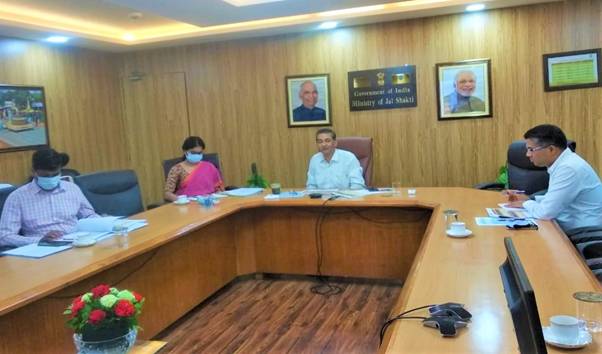The State of Uttar Pradesh presented Jal Jeevan Mission Annual Action Plan (AAP) via video conference, with details of the saturation plan for the financial year 2021-22, thereby ensuring every rural household in the State gets tap water connection. The extensive exercise of reviewing and approving the Annual Action Plan (AAP) of States/ UTs under Jal Jeevan Mission, istaken upby a national committee chaired by the Secretary, Department of Drinking Water & Sanitation and members from other ministries/ departments and NITI Aayog. Thereafter, funds are released throughout the year based on physical progress and expenditure incurred from time-to-time. The detailed planning exercise is undertaken to help the State achieve ‘Har Ghar Jal’ in a time-bound manner.
The Annual Action Plan emphasizes various components of Jal Jeevan Mission, viz. drinking water source strengthening/ augmentation, water supply works to provide household tap connections, greywater treatment & reuse, operation & maintenance, various support activities including IEC plan, training and capacity building of stakeholders, community mobilization, water quality surveillance and monitoring, strengthening of water quality testing laboratories and itsNABL accreditation/ recognition, etc.
In Uttar Pradesh, out of total2.63 Crore rural households, 31.76 lakh (12%) households have been provided tap water connections so far. Last year, 19.15 lakh tap connections were provided in the State. The State plans to provide 59lakhtap water connections in 2021-22, 85.40 lakh in 2022-23 and 90.01 lakh in 2023-24. Upon review, the committee suggested that the State may plan to provide 78 lakh tap water connections in 2021-22 itself, to which the State agreed to. The State aims to make 5 districts ‘Har Ghar Jal’ in the current financial year and work is planned to begin in 60,000 villages by end of this year.
Since the launch of Jal Jeevan Mission in August, 2019, about 26.63 lakh tap water connections have been provided in villages of Uttar Pradesh. So far, about 3,500 villages in Uttar Pradesh have been declared ‘Har Ghar Jal’, which means every rural household in these villages has started getting assured tap water supply in their homes. The State plans for saturation of another 10 thousand villages by September, 2021.It is a big step forward towards changing lives of village community especially the poor and marginalized, as JJMnot just enhancestheir ‘ease of living’. Women and young girls, who are primarily the water managers in every household,now get time to pursue other economicactivities and spend time to rest or with family, which wouldotherwise be spent infetching water from a distance multiple times during the day.
The committee urged the State to give undivided focus on coverage of priority areas, i.e. water quality-affected habitations, drought prone area, 8 Aspirational and 20 JE/ AES affected districts, Scheduled Castes/ Scheduled Tribes majority areas, Saansad Adarsh Gram Yojana, etc. The committee appreciated the efforts made by the State in providing piped water supply in 1.02 lakh(82%) schools 1.04 lakh (61%) anganwadi centres, and all ashramshalas (tribal residential schools).The State Government officials were advised to ensure safe drinking water for children in all remaining schools and anganwadi centres at the earliest. Further, to increase community ownership and participation, State has to focus on a robust IEC and behavioural change campaign.
Under Jal Jeevan Mission, community is being encouraged tocarry out surveillance of water sources and delivery points from time-to-time to ascertain the quality of water supplied. PHE Department is training and facilitating the village communities to undertake regular water quality testing in their villages. For this, timely procurement and supply of Field Test Kits (FTKs) to the Panchayats, identification of at least five women in every village for community engagement, training themon using FTKs and reporting the test result findings are given priority.

For Uttar Pradesh, with the Central allocation of Rs. 10,870 Crore in 2021-22 and opening balance of Rs. 466 Crore available with the State Government, State’s matching share of 2021-22 andshortfall of Rs. 1,263 Crore in 2019-20 & 2020-21; the total assured fund available for the implementation of JJM in the State is about Rs. 23,937 Crore. Also, Rs. 4,324 Crore has been allocatedto the State as 15th Finance Commission tied grant for water & sanitation to Rural Local Bodies/ PRIs, which the State will utilize on activities like drinking water source strengthening, grey water management, etc. There is an assured funding of Rs. 22,808 Crore for water and sanitation for the next five years i.e. up to 2025-26 through 15th FC tied grants.
Jal Jeevan Mission announced by the Prime Minister on 15th August, 2019 is under implementation in partnership with States to provide tap water connection to every rural household of the country by 2024. Under Jal Jeevan Mission, in 2021-22, in addition to Rs. 50,011 Crore budgetary allocation, there is also Rs. 26,940 Crore assured fund available under the 15th Finance Commission tied-grant to RLB/ PRIs for water & sanitation, matching State share and externally aided as well as State funded projects. Thus, in 2021-22, more than Rs. 1 lakh Crore is likely to be invested in the country for tap water supply to rural homes. Such huge investment in rural areas of the country, will certainly accelerate economic activities and also boost the rural economy by generating new employment opportunities within villages.




